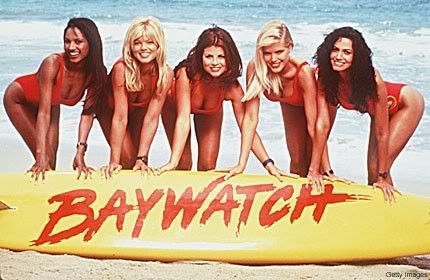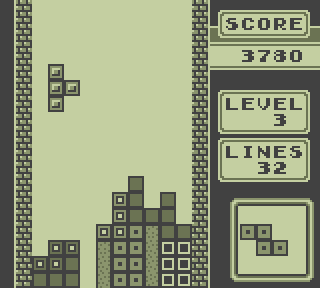
Let's be honest here: lifeguards are heroes. They're out there every day, protecting vulnerable swimmers from all manners of ill-fated ocean encounters. Their watchful eye allows us to enjoy our carefree time at the beach, knowing we are safe under their care.
Also, they sometimes run in slow motion.
I don't know about you, but while that initial job description is nice, I doubt 1.1 billion people would tune in to watch it on television. The slow motion thing, though, well, there you've got yourself a series.

Baywatch taught us all sorts of valuable life lessons, namely that beautiful women are largely interchangeable when dressed in the same signature red swimsuit. Men, on the other hand, are our true mainstays. We learned that if you were a woman who appeared on a plotless show mainly as eye candy, you could later land some lucrative Playboy covers or release sex tapes. If you were a man, you could eventually serve as a judge on America's Got Talent and battle rampant public alcoholism. Of course, if you weren't lucky enough to meet any of these grand fates, you could feel free to fade into the general obscurity that comes with people's waning interest in slow-motion footage of you in swimwear.
Remarkably, Baywatch is the most-watched show of all time. I'm not quite sure that you caught that, but either way it bears repeating. The most-watched show of all time. Lifeguards. On a beach. Limited, repetitive plotlines. Knight Rider running down the beachfront at bottom speed (is that the opposite of top speed? One can only assume.) Really, truly, how much drama can these lifeguards face on a weekly basis? The show's producers (Hasselhoff included) would contend that the answer was indeed quite a lot.
How many times have you been at beach anywhere, ever, and seen someone in a truly risky near-drowning situation? For most, the answer is rarely or never, but for the ol' Baywatch gang it was just a constant drownfest of careless parents and vicious undertows. Sharks encircled swimmers close to shore, bomb threats loomed like a dark shadow over the beach, and murderers roamed the premises on a regular basis. I'm not saying TV has to be just like real life, but at least make some effort to calibrate the premise to the plot lines. If we were dealing with marine biologists, CIA officials, or police detectives, then sure, these story lines could seamlessly integrate into the character's everyday encounters. However, these people are lifeguards. Lifeguards. They hold a giant red piece of foam and sit in a crappy makeshift elevated chair.
To be honest, I never watched the show in much detail, but it didn't take a dedicated viewer to pinpoint the improbability of these plots. While certainly the interpersonal drama between the male and female characters was substantial and there is certainly action off the beachfront, a great deal of the show relied on increasingly repetitive and formulaic scenarios. Have you ever wondered how many possible ways people could encounter danger in the water? Unless you get really creative (read: insane) with it, there are not too many permutations. Thankfully, the Baywatch writers were imaginative, though not necessarily in a positive way.
The show's initial run lacked sufficient financial backing, and was canceled after a single season. Lucky for those among us who appreciate a good slow-motion beach run sequence, the show was down but not out. David Hasselhoff, the male lead, believed in the show enough to come on as a producer and keep it afloat (sorry, I didn't even see that pun coming.) I guess the 80s German pop music scene was pretty lucrative, putting him in a fair position to make waves with Baywatch (that one was unfortunately intentional).
Repackaged and rebranded with a catchier theme song, the show quickly established itself in the ratings.
Little things other shows valued such as character development, consistency, and story variation seemed obsolete as Baywatch snowballed to success. It was camp TV at its best. It was cheesy, montage-rich, and often segued aimlessly into tangential melancholy music video-esque segments a la Ace of Base's Don't Turn Around.
The show had no shame, but it also had no pretension. Audiences accepted the fact that a steady stream of beautiful women (including Pamela Anderson, Yasmine Bleeth, Carmen Electra, and Gena Lee Nolin) had nothing better to do than get crappy jobs with the Los Angeles County Lifeguards. No one would call the show deep or insightful by any stretch of the imagination, but it did present a pleasingly idyllic form of escapism. Sometimes, after a bad day, watching scantily-clad attractive people bounce around in slow motion is just what the doctor ordered*.
It was, in short, a guilty pleasure. Many people did not want to admit that they were captivated by this cheesefest, but the ratings didn't lie. Baywatch was at the time recorded as the most-watched TV show of all time. Unfortunately, it couldn't hold its audiences forever.
As with many long-running series, the show dragged on and lost many of its original characters. The shark-jumping in this case was not only literal, but became more frequent and shameless. The early-90s dramatics evolved into late-90s near-comedy. It was that sad sort of premise that wasn't supposed to be funny, but it was unintentionally gut-bustingly hilarious. Acting fell completely by the wayside, as the equivalent of cardboard cutouts of female models chattered their lines with all the expression of reading the dictionary. The show managed to stay on the air and slide by on its purported reputation, but the magic of those Hasselhoff music video moments had dissipated.
Despite its wane in quality and popularity, its notoriety remained intact. It may not have been the smartest show or contain the most substance, but it was pure fun. They must have been doing something right, as we can only hope 1.1 billion viewers can't be wrong. The show may have been an easy target, but it generally seemed to posses redeeming qualities as well.
At the very least, a whole generation of young boys aspired to be lifeguards.
*What, your doctor never prescribed this?








